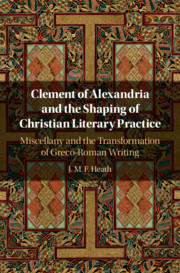 Clement of Alexandria and the Shaping of Christian Literary Practice
Clement of Alexandria and the Shaping of Christian Literary Practice Book contents
- Clement of Alexandria and the Shaping of Christian Literary Practice
- Clement of Alexandria and the Shaping of Christian Literary Practice
- Copyright page
- Contents
- Acknowledgements
- 1 Introduction
- 2 Clement’s Miscellanism and the Scholarly Trope of Christian Difference
- 3 Studying Ancient Miscellanism
- 4 Early Imperial Cultures of Miscellany-Making
- 5 Self-Introductions and Clement’s Miscellanistic Vocation
- 6 Miscellany Titles and Clement’s Divine Paratexts
- 7 The Miscellanist’s Trope of Deselecting Titles and Clement’s Conversion of Imagery
- 8 Muses in the Miscellanists’ Frame
- 9 Clement’s Theology of Hiddenness and the Logic of Christian Miscellanism
- 10 Mystery Initiation and Clement’s Literary Paideia
- 11 Poikilia
- 12 Conclusion
- Appendix The Literary Sequence of Protrepticus, Paedagogus, Stromateis (and Hypotyposeis)
- Bibliography
- Index
10 - Mystery Initiation and Clement’s Literary Paideia
The Making of a Christian Miscellanist
Published online by Cambridge University Press: 16 December 2020
- Clement of Alexandria and the Shaping of Christian Literary Practice
- Clement of Alexandria and the Shaping of Christian Literary Practice
- Copyright page
- Contents
- Acknowledgements
- 1 Introduction
- 2 Clement’s Miscellanism and the Scholarly Trope of Christian Difference
- 3 Studying Ancient Miscellanism
- 4 Early Imperial Cultures of Miscellany-Making
- 5 Self-Introductions and Clement’s Miscellanistic Vocation
- 6 Miscellany Titles and Clement’s Divine Paratexts
- 7 The Miscellanist’s Trope of Deselecting Titles and Clement’s Conversion of Imagery
- 8 Muses in the Miscellanists’ Frame
- 9 Clement’s Theology of Hiddenness and the Logic of Christian Miscellanism
- 10 Mystery Initiation and Clement’s Literary Paideia
- 11 Poikilia
- 12 Conclusion
- Appendix The Literary Sequence of Protrepticus, Paedagogus, Stromateis (and Hypotyposeis)
- Bibliography
- Index
Summary
Clement’s theme of hiddenness is connected with mystery imagery, which was a widespread topos for imagining many kinds of ‘initiation’, not only in religion and philosophy but also in more text-based arts of reading, writing and rhetoric. Clement worked creatively with this imagery to compose a mystagogical curriculum in hidden listening, where miscellanism became important at the higher stages. He shapes his three works sequentially as a programme that trains Christians to listen in a hidden way, and ultimately equips them to miscellanise better than any heretics. In the Stromateis, he engages in contemporary controversies that have sparked debate about how to miscellanise well. For Clement, miscellanism will ultimately be judged by sensitivity to the nous or telos of Scripture; this depends on a person's doctrine of God, but also on her own ethical behaviour, which conditions her possibility of knowing God and on her prayerfulness and application, for only in love and gratitude towards the Creator and in the labour of gathering passages from Scripture, is it possible truly to miscellanise well, learning the mysteries from God himself.
- Type
- Chapter
- Information
- Clement of Alexandria and the Shaping of Christian Literary PracticeMiscellany and the Transformation of Greco-Roman Writing, pp. 271 - 328Publisher: Cambridge University PressPrint publication year: 2020
